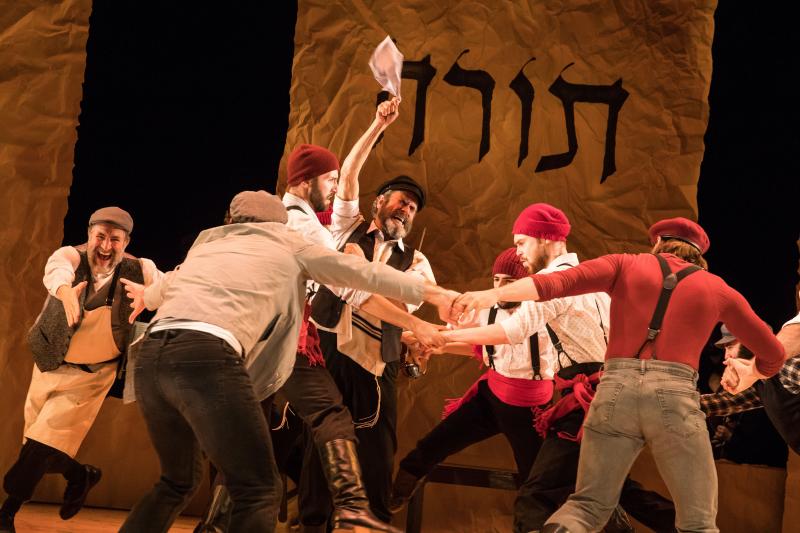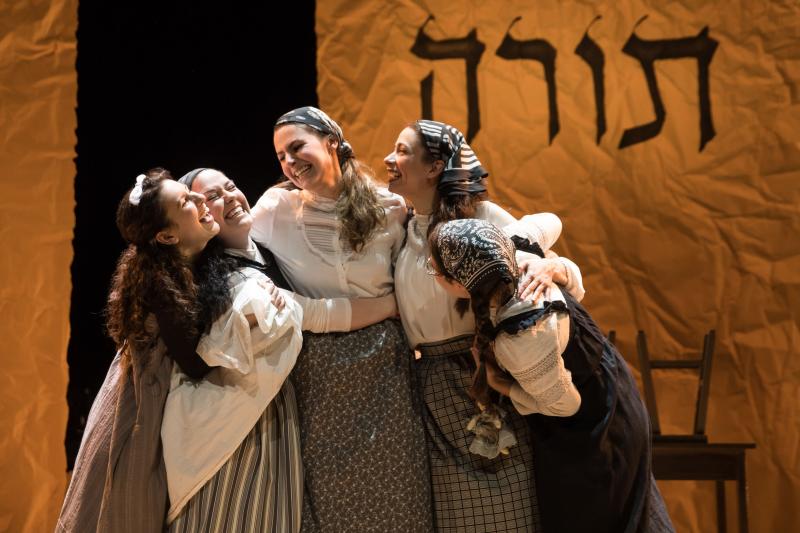Review: Joel Grey-Directed Yiddish FIDDLER ON THE ROOF Moves Uptown
The word "meshugge" seemed to really pop out for the audience, receiving a big laugh when uttered by Tevye the night this reviewer thoroughly enjoyed the beautifully acted and sung National Yiddish Theatre Folksbiene's production of Jerry Bock, Sheldon Harnick and Joseph Stein's classic 1964 musical based on the stories of Sholem Aleichem, Fiddler on the Roof.

(Photo: Matthew Murphy)
This communal reaction to hearing a line audiences traditionally known as "Sounds crazy, no?" is part of what the musical has always been about, the reaction to changes and the embracing of what is familiar. At the end of Fiddler on the Roof, the Russian Jews of Anatevka, now refugees ousted from their homeland, sing of becoming "a stranger in a strange new place, searching for an old familiar face." For those who otherwise wouldn't understand any of Shraga Friedman's 1966 Yiddish translation, a word like "meshugge" spoken in a familiar context, is that one of those old familiar faces.
And just as Tevye is asked to adjust to seeing his daughters rebel against the tradition of using a matchmaker to find a husband deemed suitable by the father, and instead choose their own life partners, audience members are asked to adjust to tweaks necessitated by the limitations of language or the desire to replicate lyricist Harnick's rhyme patterns within composer Bock's music.
So, among other revisions, the controversy concerning a horse and a mule is changed to a he-goat and a she-goat and the beloved lyric "If I were a rich man," becomes "If I were a Rothschild."
Thus, by way of an ancient language, a musical that has spent the last fifty years being produced regularly in high schools, community theatres and regional venues all across the country, as well having received numerous Broadway revivals and a popular film adaptation, is suddenly seen through a new lens.
And like so many Jewish immigrants who settled in lower Manhattan and found musical theatre as a means by which to travel uptown and work in the environs of 42nd Street, this production transfers from the Museum of Jewish Heritage to Theatre Row's Stage 42.
With little in the way of set pieces to designate locations, the story is played before designer Beowulf Boritt's parchment and cloth panels, which hide the twelve-piece orchestra conducted by Zalmen Mlotek. The word "Torah," in Hebrew letters, is prominently displayed upstage center, while English and Russian translations are flashed on both sides.

Stephanie Lynne Mason and Samantha Hahn
(Photo: Matthew Murphy)
The impeccable cast is led by Steven Skybell, a bearish Tevye of commanding strength and warm humility who gives a heartbreaking turn as a man doing his best for his wife and five daughters and who doesn't understand their rebellion against his authority.
Jennifer Babiak exudes quiet strength as Tevye's wife, Golde, torn between devotion to her husband and wanting to see her daughters happy. Jackie Hoffman, perhaps Broadway's most severely underutilized talent, so expertly nails every laugh in the comical role of Yente, the matchmaker, that you won't need to understand what she's talking about to find her delivery funny.
There is very fine work among the supporting company, which includes Rachel Zatcoff as eldest daughter Tsaytl, Ben Liebert as Motl, the timid tailor who loves her, Stephanie Lynne Mason as the free-thinking Hodl, Drew Seigla as her activist suitor Pertshik, Rosie Jo Neddy as the intellectually curious Khave and Cameron Johnson as her gentile beau Fyedke.
Even if it were performed in English, this is a heartwarming production of an enduring classic.


